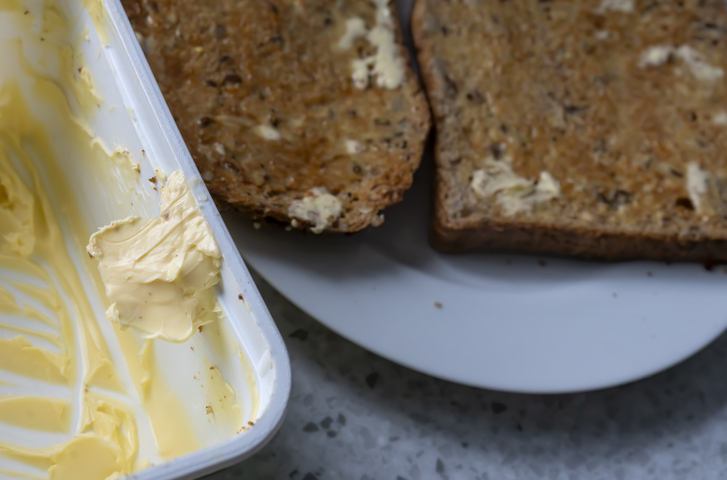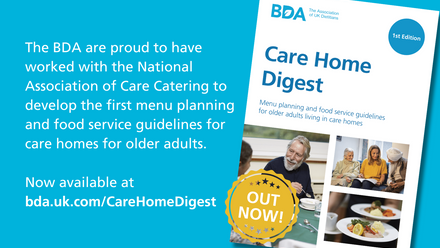Plant stanols and sterols, also known as phytosterols, are cholesterol-like compounds that are found naturally in a range of plant-based foods including vegetable oils, grain products such as breads and cereals, seeds, nuts, legumes, and fruits and vegetables.
This fact sheet looks at their role in reducing the bad type of cholesterol (non-HDL cholesterol) in our blood, which can lead to cardiovascular diseases such as heart attack and stroke.

Why do you need plant stanols and sterols?
Along with a healthy diet, eating foods that provide you with around 2g of plant stanols and sterols every day has been shown to reduce blood cholesterol levels.
A healthy diet typically contains around 200-400mg of sterols and stanols a day. However, this intake is too low to bring about a significant cholesterol-lowering effect. Plant stanols and sterols are added to certain foods such as fat-based spreads or dairy-type foods like milk, yoghurt and yoghurt drinks. These fortified foods typically contain 0.75 to 2g per serving size and can help you reach the amount needed to help lower your cholesterol.
How do they lower cholesterol?
Plant sterols and stanols have a similar chemical structure to cholesterol. They are thought to work by reducing the absorption of cholesterol in the gut so more is lost in the faeces (poo). This helps to lower total cholesterol and non-HDL cholesterol (the bad cholesterol) in the blood.
The cholesterol-lowering effect varies between individuals. There is evidence to show that eating 2g (between 1.5g to 3g) of plant stanols and sterols can lower LDL (low-density lipoprotein) cholesterol by 7.5 to 12 per cent when eaten regularly as part of a healthy diet. There does not seem to be a difference in the effect between stanols and sterols.
If you take statins (cholesterol-lowering medication), eating stanols or sterols will further lower non-HDL cholesterol. This is in addition to the 20 to 30 per cent reduction achieved by statins alone.
While taking plant stanols and sterols has been shown to reduce cholesterol levels, there is insufficient long-term evidence to show that they also reduce your risk of having a heart attack or stroke. So, in the UK, key guidelines don't recommend them for the prevention of cardiovascular disease and eating a healthy, balanced diet remains the advice.
How much of the fortified foods do I need to eat to get 2g of sterol or stanol?
If you decide to use a plant stanol or sterol fortified product, follow the instructions on the packaging. You need to take them every day, with meals, as they work by mixing with food, and in the right amount. If you stop using them, the potential benefit of lowered cholesterol will also stop.
You can achieve 2g per day of plant stanol and sterol by consuming:
- One plant stanol or sterol fortified mini yoghurt drink (one bottle) or yoghurt (one pot) per day which contains all the 2g recommended OR
- Two to three portions of foods with at least 0.8g of added plant sterol/stanol per day such as:
- Two teaspoons (10g) fortified spread
- One fortified yoghurt
- One glass (250ml) fortified milk
These can be branded or supermarket own brands.
Stanols and sterols are also available in dietary supplements. There is less evidence for the effectiveness of the supplements compared to food containing stanols and sterols. In general, studies show that stanol or sterol supplements, taken with meals, can reduce cholesterol to similar levels.
You do not need to consume more than the maximum recommended amount. Most studies show that eating more than 3g of plant stanols and sterols is unlikely to lower cholesterol levels further.
Do I need to take stanols and sterols to lower my cholesterol?
It is not essential to take plant sterols and stanols to help manage your cholesterol. They are not a substitute for a healthy diet or a replacement for cholesterol-lowering medication. To help lower your cholesterol, it is more important to make long term changes to your diet and lifestyle. These include:
- Stopping smoking
- Being more active
- Replacing unhealthy fats (trans and saturated) with healthy ones (monounsaturated and polyunsaturated)
- Increasing dietary fibre by eating more whole grains, fruits, vegetables, and legumes
- Choosing lean meat, lower fat dairy products, fish, nuts and plant-based proteins such as soy, beans and lentils more often
Can I take plant stanols and sterol products with cholesterol-lowering medication?
These products are safe for people taking cholesterol-lowering medication such as statins and fibrates. As they work in different ways to reduce cholesterol, the effect of taking both can decrease cholesterol levels more than just taking a statin or fibrate.
If you’re taking Ezetimibe (Ezetrol) cholesterol-lowering medication, you should discuss with your doctor whether there is any additional cholesterol-lowering benefit for you to take stanols and sterols.
They are not a replacement for any cholesterol-lowering medication and if you are already taking medication to help lower your cholesterol, you should inform your doctor before you start taking them.
Can anybody take plant stanol and sterols?
Plant sterols/stanols are generally safe for most healthy people. There is no benefit for people with normal levels of cholesterol.
They are not recommended for those who are pregnant or breastfeeding or for children aged under five, as there is limited reliable information of their safety in these groups.
Summary
- High blood cholesterol levels increase the risk of developing cardiovascular disease
- Consuming around 2g of stanols and sterols, in combination with a healthy diet, can help lower blood cholesterol levels. But there is no evidence to show that they also reduce your risk of having a heart attack or stroke
- Look for fortified foods to help you reach the recommended intake
- It is not essential to take plant sterols and stanols to help manage your cholesterol. Being more active, stopping smoking and eating a healthy diet are more important
- Plant stanols and sterols are not a substitute for a heathy diet or a replacement for cholesterol-lowering medication, but can be used in addition to these medications
Source(s)
Ras R.T., Geleijnse J.M., Trautwein E.A. Ldl-cholesterol-lowering effect of plant sterols and stanols across different dose ranges: A meta-analysis of randomised controlled studies. Br. J. Nutr. 2014; 112:214–219. doi: 10.1017/S0007114514000750 . Available at: https://www.ncbi.nlm.nih.gov/pmc/articles/PMC4071994/ (Accessed 17 November 2021)
Ras R.T., van der Schouw Y.T., Trautwein E.A., Sioen I., Dalmeijer G.W., Zock P.L., Beulens J.W. Intake of phytosterols from natural sources and risk of cardiovascular disease in the European prospective investigation into cancer and nutrition-the Netherlands (epic-nl) population. Eur. J. Prev. Cardiol. 2015; 22:1067–1075. doi: 10.1177/2047487314554864.
De Smet E., Mensink R.P., Plat J. Effects of plant sterols and stanols on intestinal cholesterol metabolism: Suggested mechanisms from past to present. Mol. Nutr. Food Res. 2012, 56, 1058–1072. Available at: https://onlinelibrary.wiley.com/doi/full/10.1002/mnfr.201100722 (Accessed 17 November 2021)
Han, S., Jiao, J., Xu, J. et al. Effects of plant stanol or sterol-enriched diets on lipid profiles in patients treated with statins: systematic review and meta-analysis. Sci Rep 6, 31337 (2016). Available at: https://doi.org/10.1038/srep31337 (Accessed 17 November 2021)
National Institute for Health Care Excellence (NICE) (2016). Cardiovascular disease risk assessment and reduction, including lipid modification (NICE Clinical Guideline CG181) published July 2014; last updated September 2016. Available at: https://www.nice.org.uk/guidance/CG181 (Accessed 17 November 2021)
Trautwein EA, Vermeer MA, Hiemstra H, Ras RT. LDL-Cholesterol Lowering of Plant Sterols and Stanols—Which Factors Influence Their Efficacy? Nutrients. 2018; 10(9):1262. Available at: https://doi.org/10.3390/nu10091262 https://www.mdpi.com/2072-6643/10/9/1262 (Accessed 17 November 2021)
Jakulj L, Trip MD, Sudhop T, von Bergmann K, Kastelein JJ, Vissers MN. Inhibition of cholesterol absorption by the combination of dietary plant sterols and ezetimibe: effects on plasma lipid levels. J Lipid Res. 2005; 46:2692–2698. Available at: https://www.jlr.org/article/S0022-2275(20)32857-1/fulltext (Accessed 17 November 2021)
Lin X, Racette S.B et al Combined Effects of Ezetimibe and Phytosterols on Cholesterol Metabolism. Circulation. 2011; 124:596–601. Available at: https://www.ahajournals.org/doi/full/10.1161/CIRCULATIONAHA.110.006692 (Accessed 17 November 2021)
Laitinen, K., Isolauri, E., Kaipiainen, L., Gylling, H., & Miettinen, T. Plant stanol ester spreads as components of a balanced diet for pregnant and breast-feeding women: Evaluation of clinical safety. British Journal of Nutrition, 2008 101(12), 1797-1804. Available at :doi:10.1017/S0007114508133608 https://www.cambridge.org/core/journals/british-journal-of-nutrition/article/plant-stanol-ester-spreads-as-components-of-a-balanced-diet-for-pregnant-and-breastfeeding-women-evaluation-of-clinical-safety/904C716930C7BC8FE86F051D9AFBDAFD (Accessed 17 November 2021)







